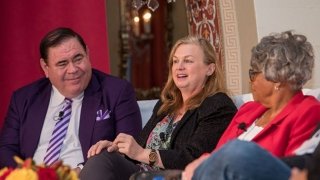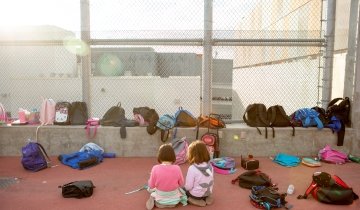While there are many ways to engage students, schools may have only scraped the surface of possible strategies.
At a gathering of educators, inventors, engineers and other leaders on May 4, experts of all sorts touted the need to work across sectors to find new ways to improve student engagement.
The convening marked the inaugural event for USC Rossier’s Center for Engagement-Driven Global Education, or Center EDGE, a center that hopes to be a bridge between economic sectors in a way that benefits education.
“We know if we can engage students early and often, if we can make them want, we’re 90 percent of the way there,” said USC Provost Michael Quick.
Alan Arkatov, the Katzman/Ernst Chair for Educational Entrepreneurship, Technology and Innovation at USC Rossier, and director of Center EDGE, laid out his vision to attendees for what USC and Los Angeles—”the epicenter of the imagination economy”—could offer.
“Engagement is something that’s always been there—that is so fundamental to teaching and learning—but hasn’t been appropriately recognized, researched, understood, taught or utilized,” Arkatov said.
Playing nice with others
Delivering the event’s keynote, Sir Ken Robinson, a bestselling author and educator, said “there is no other conversation in education that matters more than how we engage students.”
Robinson emphasized that the onus for student engagement fell on adults, not the students themselves.
“We shouldn’t be trying to fix students, we should be trying to fix the system,” Robinson said.
Not just educators, but also parents, are part of that process too, said Margaret Batjer, concertmaster for the LA Chamber Orchestra and a member of a panel that followed Robinson’s speech.

“Parents are constantly micromanaging creativity. You can’t micromanage creativity,” Batjer said. “You have to give them the courage to take risk, and then you have to teach them how to trust, because trust, especially in team sports, in orchestra—if you don’t trust each other, you have nothing.”
Other members of the panel included David Baker, CEO of the Pro Football Hall of Fame; Reveta Bowers, chair of the board of Common Sense Media and the USC Rossier Board of Councilors; Flint Dill, creative lead for Niantic Labs, creators of Pokémon GO; and Mónica García, board president of Los Angeles Unified School District.
Arkatov hopes that as people from different walks of life learn from each others’ stories, ideas will come together with research and expertise to create scalable solutions for student engagement.
This event is just a starting line.
“Ideas are the easy part,” Arkatov said. “Execution is everything.”
Video




